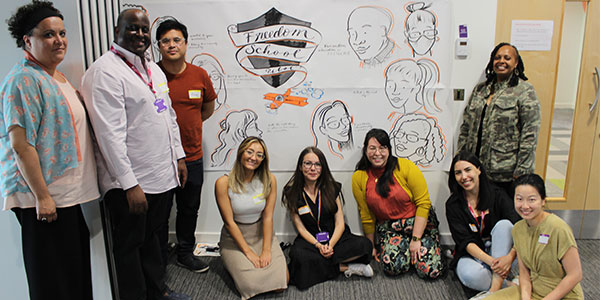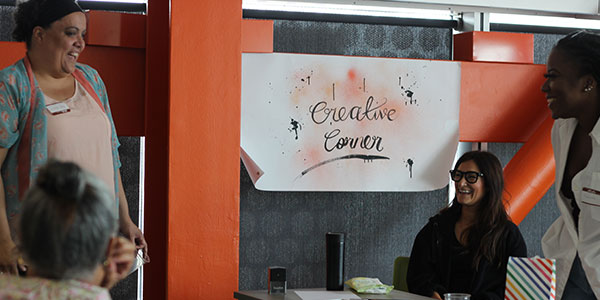Loughborough successfully pilots ‘Freedom School’ across both campuses to enhance anti-racist and decolonial knowledge and increase inclusion for BAME Doctoral Researchers

Freedom Schools are progressive learning environments with a history in the US Civil Rights movement. Taking a popular education approach, they are intended to equip historically marginalised learners with the tools to facilitate their own empowerment. In this tradition, two pilot Freedom Schools were held on the East Midlands and London campuses at the end of July.
Dr Angela Martinez Dy (Loughborough London Senior Lecturer in Entrepreneurship, Strategic Architect, Loughborough Race Equity Strategy, and BAME Staff Network Student Liaison) and Dr Addy Adelaine (CEO of non-profit organisation Ladders4Action and experienced action researcher) partnered to develop a programme promoting knowledge sharing and upskilling for researchers in the topics of anti-racism, intersectionality, and scholar-activism.
In light of Loughborough and sectoral Race Equality Charter evidence of racial inequity in Black, Asian and Minority Ethnic (BAME) Doctoral Researcher experiences, the Freedom Schools were designed to centre BAME Doctoral Researchers and Postgraduate Taught students throughout. The project was endorsed by Pro Vice-Chancellor (Research) Professor Steve Rothberg, funded by the Research Culture Fund, and supported administratively by two Doctoral Research Interns and Loughborough London Reception, HR and Finance teams.
Dr Martinez Dy said: “This Freedom School Pilot was a way for Loughborough University to advance its understanding of the needs, experiences and contributions of its Black, Asian and Minority Ethnic Doctoral Researchers and master’s students, who are shaping the future of the academy.”
Two co-creation days were held, one on each campus, where more than 30 BAME Doctoral Reasearchers reflected on the challenges they have faced in creating change. These sessions generated important and eye-opening dialogues about how institutional racism manifests in the experience of doing a PhD, and what a Freedom School might do to address these issues. It also facilitated connections and community building amongst the participants.

These were followed by two days of innovative pilot workshop sessions for 20 students and staff, which included a talk and panel presentation on intersectionality, an artistic creative corner, interactive workshops for scholar activists, and visual scribing of the closing events by professional illustrator Emily Catherine. Day One was open to people of any identity whereas, following the third of the University’s Race Equity Guiding Principles, Day Two was BAME-only.
The diverse range of excellent speakers included:
- Dr Arun Verma, Head of the Race Equality Charter, Advance HE and editor of ‘Anti-Racism in Higher Education: An Action Guide for Change’
- Tré Ventour-Griffiths, Public Historian of Black British History and spoken word poet
- Tasnim Hassan, Durham University Social Policy PhD Student researching youth, disability and ethnicity
- Agostinho M.N. Pinnock, Doctoral Researcher with LU Centre for Doctoral Training (CDT) “Feminism, Sexual Politics and Visual Culture” and co-convenor of the Global Black Geographies (GBG) Collective
- Michelle Harewood, Doctoral Researcher at University of East London and international development and human rights trainer
- Froilan ‘Froi’ Legaspi, Citizens UK, Senior Organiser with Citizens UK and co-facilitator of the 2021 LU Collective Anti-Racist Efforts (CARE) x CUK Training and Listening Campaign
In addition to designing and facilitating the events, Dr Adelaine and Dr Martinez Dy also delivered talks on power, knowledge and allyship as well as scholar-activism. Participants found the events both inspiring and insightful, and the in-depth discussions expertly and openly facilitated, with accessibility needs placed front and centre.
Dr Martinez Dy said: “By running co-creation events in which we compensated them for their labour, and delivering a range of genuinely inclusive pilot workshop sessions centring anti-racist and intersectional feminist praxis, we demonstrated both the demand and enthusiasm for this set of topics as well as the readiness of Loughborough and Loughborough London BAME Doctoral Researchers to engage with the institution as knowledge creators.”
Loughborough CITHEI mini-CDT students Rhianna Garrett and Iman Khan were interns for the project, and contributed their insights throughout as well as supported delivery on the days.
Iman said: “After previously co-hosting the Race Equity Town Hall alongside Dr Angela Martinez Dy, it has been invigorating to see how staff and student partnerships continue to flourish to create a welcoming and inclusive environment for BAME students.
“Bringing in Ladders4Action and collaborating alongside fellow PhD student Rhianna Garrett re-energised me as a decolonial PhD student. Even though I helped facilitate this remotely whilst in Pakistan, I could already feel the empowering momentum of the University community coming together. Bringing in external BAME speakers as inspirational role models was a unique working experience unlike any other – when you know you are helping to nudge academic, social and spiritual change.”
Rhianna added: “Running the Freedom School as a racialised minority PhD was not just an academic and educational experience, but almost a spiritual one. I felt comfortable and calm. This is how it feels to be safe. I realised in that moment I had never felt that way in an academic environment.
“Not only is this an opportunity to understand decolonial and anti-racist teachings, but an opportunity to heal and grow as individuals, and to feel empowered from our identities that are typically ‘marginalised’ in higher education. We created a community that day and I can see it becoming an actionable force for change.”
Equity, Diversity and Inclusion
Reflections, comments, discussion and opinion on EDI topics from Loughborough University staff and students